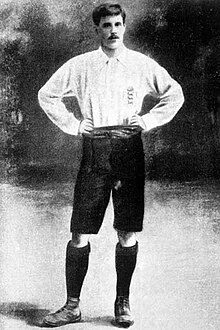Vivian Woodward
Vivian "Viv" John Woodward (born June 3, 1879 in Kennington , London , † January 31, 1954 in Ealing , London) was an English amateur football player , long-time captain of the English national team and gold medalist for Great Britain at the Summer Olympics in London in 1908 and in 1912 in Stockholm .
Athletic career
Woodward moved to Clacton when he was a teenager , attended Hascham College and first drew attention to himself when he played against a B-selection of the Clacton Town club in November 1895 . Although he lost this game 3-6, he was to join this B-team just a month later - against the original resistance of his father, who despised football and preferred cricket . With his debut on December 14, 1895 for Clacton Town, he was so impressive that he was promoted to the club's A team just a week later.
His club had joined Division Two of the North Essex League at the beginning of the 1895/96 season and Woodward was able to win the championship there twice in his time at Clacton Town until 1900, as well as the Essex Junior Cup . After a few games for a Suffolk selection, as well as for Harwich & Parkeston and Colchester Town , he moved to Chelmsford at the age of 21 . When he played in a game of a south against a north selection in the stadium on White Hart Lane in 1902 , he was discovered by the local Tottenham Hotspur and accepted into the team.
The center forward , who was very interested in tennis and even roller skating in addition to cricket , became one of the world's best players of his time with this club and contributed two goals to the 4-0 win against Ireland on his debut in the national team . During his international career until 1911, he scored 29 goals in a total of 23 games, with this goal rate being a record well into the 1950s. In absolute terms, too, he was the national team's record goalscorer with 29 goals until Tom Finney beat him against Northern Ireland in one of his last international matches with his 30th and final goal in 1958 . The same succeeded two weeks later Nat Lofthouse against the Soviet Union , who was also able to overtake Woodward with his last goal shortly before the end of his career. He had already been overtaken by Lofthouse in 1956 and Finney in 1958, but remained the top scorer until October 1958. Woodward himself had caught up with the previous record holder Steve Bloomer with two goals in his last outing against Wales in 1911 . He was also active in the English amateur team and scored 44 hits in 30 games. A high point was his eight goals in a 15-0 victory over France in Paris in 1906. These statistics are based on information from the newspapers “ The Times ” and “Sporting Lives” ( he only officially scored four goals from FIFA attributed).
In the same year, when Woodward won the gold medal as team captain for Great Britain at the domestic Olympic Games in 1908, Tottenham Hotspur was accepted into the Second Division of the Football League . Woodward scored the first goal in Tottenham's league history in a 3-0 win in front of 20,000 spectators against Wolverhampton Wanderers and was immediately promoted to the First Division with his team . He immediately joined Chelsea , where he scored 34 goals in 116 games by 1915.
Another highlight was winning the gold medal again in the 1912 Olympic tournament. Three years later, Chelsea reached the FA Cup final and, despite the outbreak of World War I , Woodward was given permission by the Army to play in that final. Woodward, who had not played in the course of the competition, waived his bet and left his competitor Bob Thompson the preference.
Woodward completed his last season in the 1919/20 season, when he led the Essex County team as captain at the age of 40 .
After retiring from active football, Woodward was employed as a director at Chelsea between 1922 and 1930. He then bought a farm in Chisbon Heath and also ran a dairy in Frinton-on-Sea . Woodward, who was wounded during the war while serving with the Middlesex Regiment and never really recovered, died on January 31, 1954 in a London retirement home. Only after his death did he receive an appreciation for his sporting achievements and was included in the list of the hundred best players in the Football League.
successes
- Olympic gold medalist: 1908, 1912
Club stations
- Clacton Town (1895-1900)
- Suffolk, Harwich & Parkeston, Colchester Town, Chelmsford (1900-1902)
- Tottenham Hotspur (1902-1908)
- Chelsea FC (1908–1915)
- Essex County (1920)
Web links
- Photo by Vivian Woodward
- RSSSF list of Woodward's international assignments
- Vivian Woodward in the Sports-Reference database (English; archived from the original )
| personal data | |
|---|---|
| SURNAME | Woodward, Vivian |
| ALTERNATIVE NAMES | Viv |
| BRIEF DESCRIPTION | English soccer player |
| DATE OF BIRTH | June 3, 1879 |
| PLACE OF BIRTH | Kennington , London |
| DATE OF DEATH | January 31, 1954 |
| Place of death | Ealing , London |
